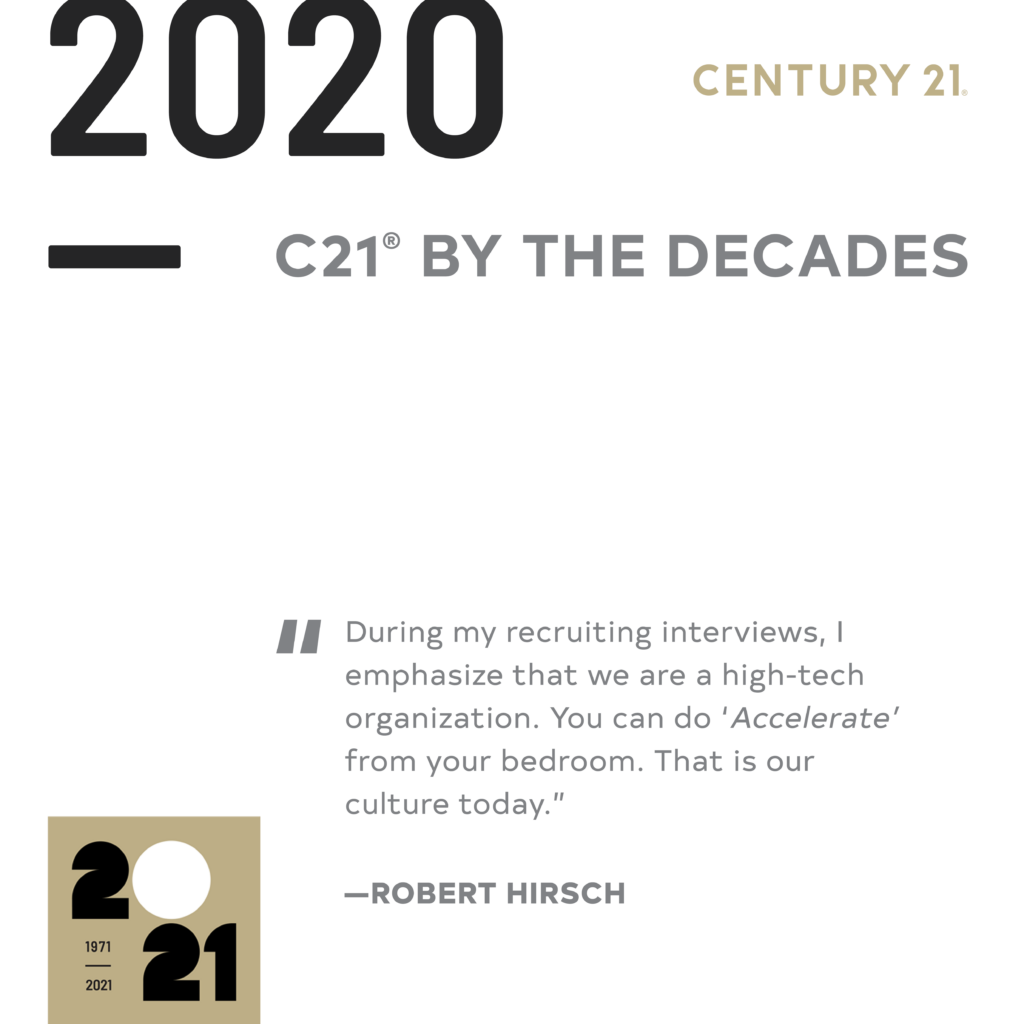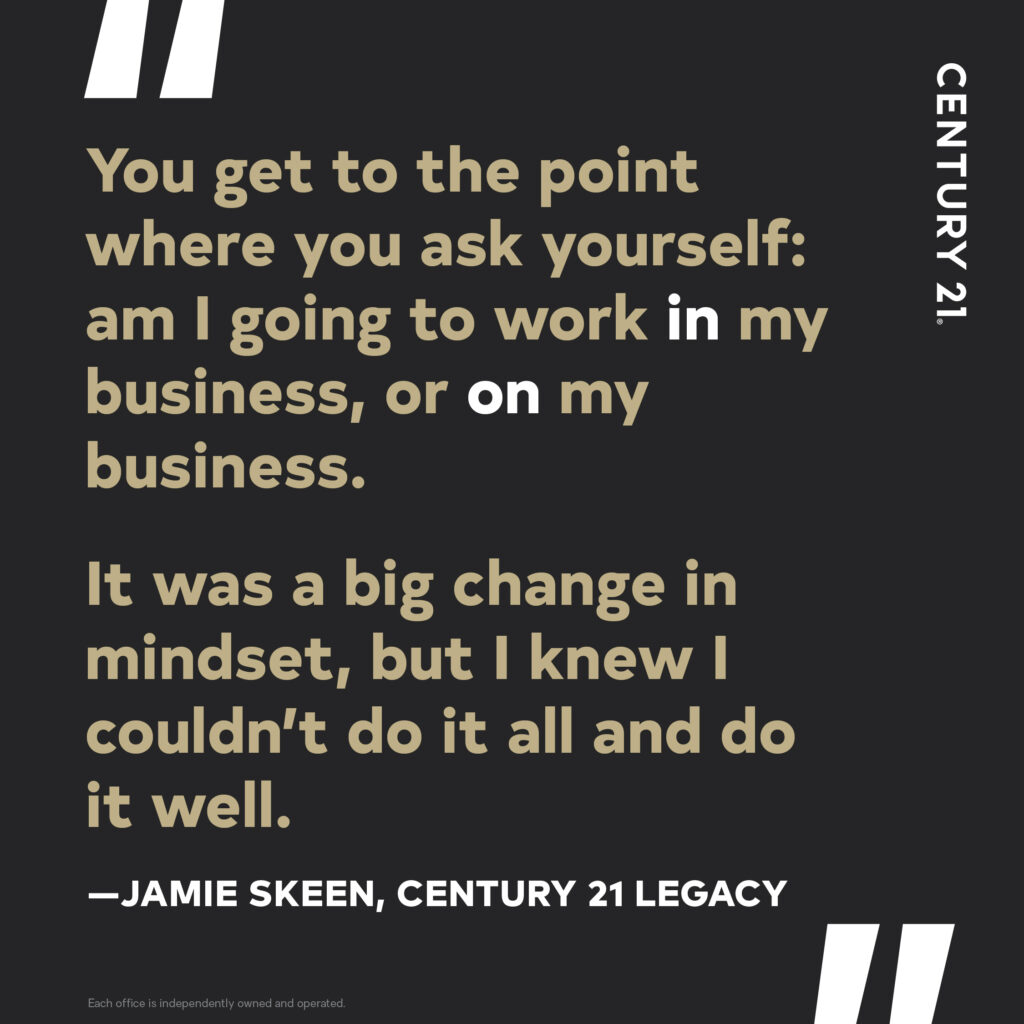My Real Estate Thoughts
Tue Dec 20 16:22:07 UTC 2022
M&A – IT’S ALL ABOUT THE AGENTS
Andrew Hauck learned everything he knows about real estate from his mom. As the broker/co-owner of CENTURY 21 Signature Realty in Saginaw, Michigan, Andrew started…
The post M&A – IT’S ALL ABOUT THE AGENTS first appeared on Century 21®.Andrew Hauck learned everything he knows about real estate from his mom. As the broker/co-owner of CENTURY 21 Signature Realty in Saginaw, Michigan, Andrew started selling real estate with her when he was just 21 years old and still in college.
Today, his brokerage boasts 10 offices serving Saginaw, Midland, Bay and Genesee Counties in Central Michigan near Lake Huron’s Saginaw Bay and based on transaction volume, CENTURY 21® franchise affiliate in Michigan in 2021.
Destined to Close Deals
The son of CENTURY 21 affiliated agent Jan Hauck, Andrew grew up watching his mom show houses, take calls and negotiate deals. You couldn’t miss what his mom did for a living – bulky MLS books stacked in the closets, For Sale signs leaned against the wall, and everyone knew there was no talking or horsing around when she was on the phone. Yet despite the 70 hours she dedicated to her business each week, she was always at his games and school events and was there to pick him up from school every day
Fast forward to college, Andrew studied business with plans of going into management consulting. About half-way through, he realized that a real estate business could be more lucrative and rewarding, so he decided to follow in his mom’s footsteps. Between finance and macroeconomics classes, Andrew earned his real estate license and started gaining real-world experience, learning the importance of providing exceptional experiences to his clients. By the time he graduated with a bachelor’s degree in economics, he’d already helped clients purchase and sell several properties.
After a few years, Andrew went back and earned an MBA to shore up his credentials. “There weren’t many 25-year-old agents who already owned their own house and had five years of experience, so that helped with my credibility. It was even more valuable when I became a broker-owner.”
The CENTURY 21 Brand Can Open Doors
He’s been a loyal CENTURY 21 affiliated agent from the start. His mother started the brokerage as an affiliate of Century 21 Real Estate LLC in 2005 with two partners, Ken Kujawa and Dr. Sam Shaheen. In early 2019, Andrew purchased his mother’s stake in the brokerage and took over operations while she returned to sales.
As a new broker/owner, his mom cautioned him to never underestimate the importance of empathy, camaraderie and a building agents can call home. He knew that to be successful in real estate, you had to play an active role in the community. So, at a time when many brokerages were cutting costs and closing offices, Andrew made his offices a cultural cornerstone.
“We operate in smaller markets, where it’s so important to be visible and active in the community. For us, it’s just part of our culture. Our offices are involved in local events, from pet adoptions and fundraisers to parades. We look for opportunities where we can really get involved, not just slap our logo on a program.”
He says the national name recognition of the CENTURY 21 brand has given the brokerage a huge advantage, especially in Michigan where the brand has had a presence since its founding in the ‘70s. “The CENTURY 21 brand is the most recognized and respected name in real estate*, so we never have to explain who we are. We can focus on our value proposition, which makes everything so much easier.”
Not a ‘status quo’ kind of guy, Andrew is relentless in looking for what’s next, what else the brokerage can do to differentiate itself and take it to the next level. That’s another reason why he appreciates the CENTURY 21 brand. “They’ve always been very proactive in helping brokers achieve their business goals and willing to evolve. As a broker, that’s how I approach my own business, so that’s always been a great value to me.”
Mom’s Greatest Lesson
While Andrew is the first to say he learned everything he knows about real estate from his mom, he says the most important thing he learned from her was professionalism. “From the minute she became an agent, she was nothing but professional. I’ve seen too many treat it like a hobby or just a side gig, but to her, it’s always been a serious commitment to deliver extraordinary experiences.”
This professionalism is one of the biggest challenges Andrew sees brokers facing today. “When you only focus on money – how many deals you’re making and for how much – you lose sight of what’s most important, and that’s helping people. Real estate is about improving the lives of agents and helping communities. Professionalism means providing mentoring, oversight and accountability. If you don’t, things can get sloppy, mistakes are made and deals fall through.”
Andrew says that’s why his brokerage is selective in the agents they choose to affiliate, seeking professionals who want to learn and serve their community.
Focusing on Agents, First
Despite serving relatively small communities across Central Michigan, CENTURY 21 Signature Realty has earned a spot on the Real Trends 500 list every year since 2018, which ranks the top brokerages nationwide. It’s also the only Real Trends 500 company in the Great Lakes Bay region, a fact Andrew attributes in part to his mergers and acquisitions strategy – the brokerage has completed three in as many years with another in the works.
“The CENTURY 21 brand is an enormous help during the search and discovery phase by assisting with local market conditions, verifying brokerage and agent data, and even setting up meetings with potential M&A targets. It also provides resources, assistance and personnel to ensure the acquisition is a success.”
When considering other brokerages for mergers and acquisitions, Andrew says it’s very important to only consider companies that share your values and culture. CENTURY 21 Signature Realty has an “agents first” approach.
“We’re here to work for the agents, not the other way around. We offer constant support, celebrate their successes, and hold high standards and morals. It’s about sharing and caring. It’s about trusting each other and working as a team. If a potential M&A doesn’t share these values, I’ll walk away. It’s not worth diluting our culture.”
Andrew says most brokers struggle with something – it might be mentoring agents, marketing, name recognition or a lack of tools. When speaking with a potential acquisition, Andrew’s team digs to identify what’s missing and how CENTURY 21 Signature Realty could make a difference on day one.
“A lot of broker-owners are wearing too many hats. They cut the checks, input data, deal with difficult closings, handle marketing. But you can’t do it all well. That’s why we’ve built a strong support team, so our leaders can focus on providing agent learning and coaching opportunities.”
Just as important as sealing the deal on an acquisition is on-boarding the agents, teaching them about all the new tools and programs they can access through the CENTURY 21 brand, and bringing them into the culture. That’s an area where Andrew says he and his partners really excel. New agents start out with a 30-day mentoring program to learn the ropes, and both new and experienced agents are enrolled in CENTURY 21 University® courses to expand their skills and learn about all the available resources.
So, four years after he took the helm, what does mom think about his real estate business?
“I think she’s very proud. She sees how hard I work and how much goes into it. But I also think she misses her real estate partner, since she’s still out there listing and selling but I’m more focused on the operations side of things now. We were a great team!”
*2021 Ad Tracking Study. The survey results are based on 1,200 online interviews with a national random sample of adults (ages 18+) who are equal decision makers in real estate transactions and active in the real estate market (bought or sold a home within the past two years or, plan to purchase or sell a home within the next two years). Brand awareness question based on a sample of 1,200 respondents. Results are significant at a 90% confidence level, with a margin of error of +/-2.4%. Recognition question based on consumers aware of brand in question. Results are significant at a 90% confidence level, with a margin of error of +/- 2.4%. The study was conducted by Kantar Group Limited (formerly Millward Brown), a leading global market research organization, from November 9-27, 2021.
©2022 Century 21 Real Estate LLC. All rights reserved. CENTURY 21®, the CENTURY 21 Logo and C21® are trademarks of Century 21 Real Estate LLC. The CENTURY 21® System fully supports the principles of the Fair Housing Act and the Equal Opportunity Act. Each franchise is independently owned and operated. This is not intended, and shall not be deemed to constitute, an offer to sell a franchise. Franchise offerings made only by a Franchise Disclosure Document. THESE FRANCHISES HAVE BEEN REGISTERED UNDER THE FRANCHISE INVESTMENT LAW OF THE STATE OF CALIFORNIA. SUCH REGISTRATION DOES NOT CONSTITUTE APPROVAL, RECOMMENDATION OR ENDORSEMENT BY THE COMMISSIONER OF CORPORATIONS NOR A FINDING BY THE COMMISSIONER THAT THE INFORMATION PROVIDED HEREIN IS TRUE, COMPLETE AND NOT MISLEADING. This advertisement is not an offering. An offering can only be made by a prospectus filed first with the Department of Law of the State of New York. Such filing does not constitute approval by the Department of Law. The Minnesota registration number for this franchise system is #F186. Century 21 Real Estate LLC, 175 Park Avenue, Madison, NJ 07940.
The post M&A – IT’S ALL ABOUT THE AGENTS first appeared on Century 21®.Tue Jul 26 14:32:39 UTC 2022
Eugene F. Pridgett III, owner of CENTURY 21 The Gene Group in Dayton, Ohio, has a long list of roles he’s played: Air Force veteran,…
The post first appeared on Century 21®.Eugene F. Pridgett III, owner of CENTURY 21 The Gene Group in Dayton, Ohio, has a long list of roles he’s played: Air Force veteran, stockbroker, software engineer, real estate broker, business owner, husband. Now he can add another – television star.
He was recently featured in an episode of “Military Makeover: Operation Career,” hosted by Montel Williams highlighting Century 21 Real Estate LLC. This special episode explored how the real estate industry and the CENTURY 21® brand provides great opportunities for military service members looking for a new profession as they transition to civilian life.
The CENTURY 21 brand is proud to support veterans who affiliate with a CENTURY 21 brokerage through its exclusive Recruiting America’s Heroes program for newly retired veterans, transitioning veterans, active military, reservists, military spouses and surviving military spouses. Where applicable, participating agents receive up to 40% off the online real estate pre-licensing course, up to 40% off continuing education courses through the CE Shops (in select states) and a welcome gift from the CENTURY 21 brand.
Skills That Last a Lifetime
Gene enlisted in the Air Force after college, specializing in avionics and programming software for F15 fighter jets. “It was my job to get the sorties in the air,” Gene says, which meant being responsible for the jet’s software and fixing things that went awry. He learned skills that have lasted a lifetime – analytical problem solving, quick thinking, working under pressure, teamwork, attention to detail, dedication to serving.
He expected these would translate well to a career as a stockbroker after he left the military, but ironically, it was the sales part that didn’t suit the future real estate broker. “I was too truthful. I’d tell clients, ‘You know, this isn’t a smart move because these fees are crazy. You can’t make the kind of money you’re looking for this way.’ Finance is, obviously, all about the money, but I was more about watching out for my clients’ interests.”
So, he returned to what he knew best, beginning what would become a 20-year career in software engineering for a major aerospace corporation that supported the military. Gene worked in configuration management, ensuring completed software was clean with no backdoors or additional software added in that could create issues.
Looking for a new challenge after two decades, he again turned to those invaluable skills he learned in the Air Force. Real estate had always interested him, so he began investing in and flipping houses. Over time, he developed algorithms to identify the best investment opportunities and how to best evaluate properties. (Because that’s what you do when you’re an ex-military software engineer who goes into real estate.)
What he found was that he loved helping people more than anything.
(Don’t) “Show Me the Money”
“It all came back to that foundation of service, which is what the military is all about – I wasn’t the warfighter, I supported the warfighter. Anything you do consistently over time becomes the baseline, becomes absorbed. Our greatest purpose on this planet is to be of service to others. You never see a
U-Haul following a hearse, because you can’t take it with you. I wasn’t in it for the money.”
So, he earned his real estate and then broker’s license and started his own independent brokerage. As his business grew, the offers started coming in – offers to merge, be purchased, affiliate with a brand. He’d always listen politely to what they had in mind, but he was never interested because they were always just about the money.
“When the CENTURY 21 brand approached me, they talked about a partnership, and that got my attention. My affiliated agents know I’m not sitting in the command quarter making decisions, I’m out on the battlefield with them,” Gene says, peppering his comments with military terms. “The CENTURY 21 brand operated the same way as me. I was talking to the heads of the departments and the president and CEO, Mike Miedler. They have approximately 14,000 offices, but he took the time to get to know me. I could reach out to him if I needed to talk, and that meant a lot. It still does.”
Gene was also attracted to the brand’s 50-year track record and reputation as the most recognized and respected name in real estate1. “The CENTURY 21 name is known around the world, which makes a big difference. They also had a robust tool set and systems that allowed me to plug in and help me grow my business. I didn’t have to reinvent the wheel and I didn’t have to use any tools that maybe didn’t align with my approach.”
Military – The Making of a Good Agent
Gene has seen from experience that veterans often make great real estate agents because of their transferable skills. Both the military and real estate are all about service and working toward the greater good. Veterans are dependable and value consistency, so they seek careers with systems and processes in place that create predictable outcomes. They’re very goal oriented and excellent problem solvers. They’re used to quality training so they can continuously improve and grow their skills. They want a reliable source of correction when things start to go off track, so they’re very coachable. They thrive in environments where they work alongside leaders who want to contribute to their success for a mutually beneficial outcome.
“A diamond is coal – the only difference is pressure. Veterans have just been under different pressures. That’s not saying the diamond is better than the coal, because the coal will heat your home. It’s just that we need to be in a different setting to be our best. And I think real estate is that type of setting.”
While he doesn’t specifically focus on recruiting veterans, they naturally find their way to him based on his proximity to the Wright-Patterson Air Force Base. But he says most of his military-related agents are actually military or veteran spouses, which he considers to be veterans, too. “When your spouse is active duty, you are, too. You’re part of the squadron.”
Hungry and Humble
CENTURY 21 The Gene Group currently has 40 affiliated agents in Dayton and four in Cincinnati, with another 30 in the queue waiting to affiliate. But he’s very selective about who he chooses to partner with.
“They have to be hungry and humble. When I meet with prospects, I tell them real estate is work, it’s effort. You have a great responsibility and there will be challenges. But you’re the one that helps clients work through the emotions of buying and selling a home. You are their trusted advisor, and you have to be committed to that.”
Gene lives by three rules, both in business and in life:
- Do what’s right because it’s right.
- Trust can’t be granted – it must be earned.
- Give more than you expect to receive.
“If you’re not in alignment with these, you won’t be a good fit for my brokerage.”
Many of the agents Gene affiliates are new to real estate, which is by design because he can mentor them on the right way to do things. He developed an onboarding system that helps agents move from “green to gold” quickly. There’s a team that walks them through the affiliation process, helps with the paperwork, orders business cards and guides them on all aspects of real estate. His goal is to remove obstacles and decision fatigue, so they remain excited about their new profession and do not become overwhelmed.
He also plugs them into everything the brand offers, from C21 University® to the marketing and productivity tools. “If they want to go into commercial real estate, build a team – whatever direction they want to head in, I know the CENTURY 21 brand and I can help them.”
Working with agents and supporting them as they build a business has been a perfect match with Gene’s focus on service. “I’ve always met sales milestones and that’s been great. But helping an agent make an income she never thought was possible, enough to take her kids to Disney World – that means so much more to me.”
According to the National Association of REALTORS®, the typical agent handles 9-10 transactions a year2. “Those statistics are based on the wind shear agents face. But what if I could take that wind shear away? That’s what I’m trying to do – create an environment where challenges are minimized so agents can grow faster and go farther with the right systems and tools. My philosophy is, ‘If you want to go fast, go it alone. If you want to go far, go with a team. If you want to go real far and real fast, go with us!’”
Wind shear… Spoken like a true aerospace engineer.
Serving Those Who Serve
The Realogy Military Rewards program, available through Anywhere Real Estate Inc. (formerly Realogy Holdings Corp.), the parent company of Century 21 Real Estate LLC, supports military and veteran family homebuyers and sellers by offering $350-$7,500 in cash back3 after closing when they buy and/or sell a home with a participating agent, based on the home sale and/or purchase price.
CENTURY 21 The Gene Group is also invested in supporting members of the military who are relocating to or from the Wright-Patterson Air Force Base. Gene believes having a veteran leading the agency adds a level of confidence because they know he understands their unique challenges.
Gene’s team has a special process in place to help military clients with a PCS (permanent change of station), who typically have a very limited time to find a home and a tight deadline to move. Prior to the client arriving, they have several phone conversations to understand their needs and aspirations. The agent blocks several days off and prepares a showing execution plan so properties that meet their criteria are lined up and ready to view. His team shows them how to apply for VA financing, walks them through making an offer, and ideally, they leave with a contract so there’s one less thing to worry about.
Gene quotes Chaka Khan lyrics to illustrate his relentless approach to service, whether it’s to relocating military families, non-military clients or agents: “Through the fire, to the limit, to the wall.”
And that perfectly sums up how Gene rolls.
1 Study Source: 2021 Ad Tracking Study. The survey results are based on 1,200 online interviews with a national random sample of adults (ages 18+) who are equal decision makers in real estate transactions and active in the real estate market (bought or sold a home within the past two years or, plan to purchase or sell a home within the next two years). Brand awareness question based on a sample of 1,200 respondents. Results are significant at a 90% confidence level, with a margin of error of +/-2.4%. Recognition question based on consumers aware of brand in question. Results are significant at a 90% confidence level, with a margin of error of +/- 2.4%.
The study was conducted by Kantar Group Limited (formerly Millward Brown), a leading global market research organization, from November 9-27, 2021.
2 2021 National Association of REALTORS® Member Profile.
3 The cash back bonus is offered in most states. In some states, a gift card or commission reduction at closing may be provided in lieu of the cash back bonus. The program is not available for employer-sponsored relocations or transactions in Iowa or outside the United States. The cash back bonus is not available in Alaska and Oklahoma. In Kansas and Tennessee, a MasterCard MAX gift card will be issued. In Mississippi, New Jersey, and Oregon, a commission reduction may be available at closing. The cash back bonus is only available with the purchase and/or sale of your home through the use of a program-introduced real estate agent. The actual amount you receive is based on the purchase and/or sale price of your home. The program award is not available in certain transactions with restricted agent commissions (including many new construction, For Sale by Owner, or For Sale by iBuyer transactions). Your assigned agent can help you identify any transactions where the award would not be available. All real estate commissions are negotiable. Other terms and conditions may apply. This is not a solicitation if you are already represented by a real estate broker. Please check with a program coordinator for details. Program terms and conditions are subject to change at any time without notice. Additional terms, conditions, and restrictions apply.
©2022 Century 21 Real Estate LLC. All rights reserved. CENTURY 21® and the CENTURY 21 Logo are trademarks of Century 21 Real Estate LLC. The CENTURY 21® System fully supports the principles of the Fair Housing Act and the Equal Opportunity Act. Each franchise is independently owned and operated. This is not intended, and shall not be deemed to constitute, an offer to sell a franchise. Franchise offerings made only by a Franchise Disclosure Document. THESE FRANCHISES HAVE BEEN REGISTERED UNDER THE FRANCHISE INVESTMENT LAW OF THE STATE OF CALIFORNIA. SUCH REGISTRATION DOES NOT CONSTITUTE APPROVAL, RECOMMENDATION OR ENDORSEMENT BY THE COMMISSIONER OF CORPORATIONS NOR A FINDING BY THE COMMISSIONER THAT THE INFORMATION PROVIDED HEREIN IS TRUE, COMPLETE AND NOT MISLEADING. This advertisement is not an offering. An offering can only be made by a prospectus filed first with the Department of Law of the State of New York. Such filing does not constitute approval by the Department of Law. The Minnesota registration number for this franchise system is #F186. Century 21 Real Estate LLC, 175 Park Avenue, Madison, NJ 07940.
The post first appeared on Century 21®.Thu Jul 21 02:33:00 UTC 2022
Does fear hold you back? Whether it’s a fear of failure, fear of rejection or fear of peanut butter sticking to the roof of your…
The post first appeared on Century 21®.Does fear hold you back? Whether it’s a fear of failure, fear of rejection or fear of peanut butter sticking to the roof of your mouth (Google it, arachibutyrophobia is a real thing), fear can stop you from living your best life.
As The Relentless podcast fast approaches its one millionth download, we’re getting ready to launch Season 3, which will to focus on the notion of moving fearlessly. In a world filled with noise and distractions, we’ll look at how today’s most interesting entrepreneurs move fearlessly past obstacles and the assumptions that hold others back. We’ll talk with the people who transform what scares them into something that inspires as we explore how to build confidence, take risks and tackle the hard problems.
Since we started this podcast three years ago, we’ve packaged together more than 13 hours of content and spoken with over 30 guests — a diverse mix of successful entrepreneurs and effective salespeople who look at sales differently. In this special episode, we’re rounding up some of the best advice guests have shared over the past two seasons.
Bounce Back and Learn from Failures
Every entrepreneur experiences failure and rejection — it’s unavoidable. What you do with that failure will leave a lasting impact, whether positive or negative. Do you learn a valuable lesson, strategize how you’d approach the situation differently next time and bounce back even stronger? Or do you allow it to create fear that holds you back?
Actor and comedian Adam Ferrara is no stranger to rejection. Yet through countless auditions that ended in failure, he’s taken away a few important lessons that have helped him grow personally and professionally. He knows that even if you don’t get the part, the contract, the listing, you can learn from every failure or rejection and use it to hone your skills and grow.
Build Empathy
In business, being able to read the room and understand what others are feeling is a vital skill. When a deal is heading south, customers are on the fence or a valued employee is about to bolt, what happens next just may depend on your ability to pick up on their emotions and understand why they’re feeling that way.
We explored empathy in two episodes. Famed author, serial entrepreneur and public speaker, Gary Vaynerchuk discussed how everything starts with listening to people. Every interaction — from passing conversations to negotiating major deals — is impacted by how other people feel about you and how you interpret and respond to their emotions.
By understanding the situation, reading the room and anticipating peoples’ needs, you can be proactive and address any issues instead of being forced into reaction mode. Michael Atwood, the broker and co-owner of CENTURY 21 Atwood Realty in Minnesota, explained how empathy impacts the customer experience. Because when we’re invested in our clients, participate with them and get excited about their journey, they feel appreciated and supported.
Learn Digital Body Language
Body language often says way more about our feelings and intentions than the words we speak. It’s human nature — when we’re engaged in a conversation and trust the person we’re speaking with, we naturally smile, uncross our arms and make eye contact. But in an increasingly digital and remote world, we’ve lost the opportunity to use these nonverbal cues to connect with people.
So, does body language have a digital equivalent?
Erica Dhawan, communication expert and author of Digital Body Language: How to Build Trust and Connection, No Matter the Distance, examined how to take real-world emotional body language and translate it for the digital world.
Create Joy and Delight
Every entrepreneur knows that customer satisfaction is paramount to a successful business. But what if you could elevate that satisfaction to a whole new level? Creating joy and delight is all about surpassing expectations and delivering such a positive experience that customers will remember it, tell their friends and come back for more.
Tina Roth Eisenberg, a Swiss designer and serial entrepreneur who founded Tattly, which offers fake tattoos designed by real artists, gave tips on how to add surprise and delight to your products and services.
Coming Soon: Season 3
These are just a few important takeaways from some of our inspiring guests. As we gear up for the launch of Season 3, we invite you to listen to this special episode for highlights of Seasons 1 and 2.
The Relentless is the podcast that looks at sales differently, created in partnership with Century 21 Real Estate LLC and Slate Studios — is a Webby honoree for best branded podcast and is ranked among the top 1% of all podcasts. Visit The Relentless website to join the conversation, and subscribe to the podcast on Apple Podcasts, Spotify, Overcast, Stitcher or TuneIn.
© 2022 Century 21 Real Estate LLC. All rights reserved. CENTURY 21®, the CENTURY 21 Logo and C21® are registered service marks owned by Century 21 Real Estate LLC. Century 21 Real Estate LLC fully supports the principles of the Fair Housing Act and the Equal Opportunity Act. Each office is independently owned and operated.
The post first appeared on Century 21®.Fri Jun 03 16:00:15 UTC 2022
Defying Mediocrity is Game Changing
21 Years with the CENTURY 21® brand When Jamie Skeen boldly purchased his town’s largest brokerage after fewer than two years as an agent and…
The post Defying Mediocrity is Game Changing first appeared on Century 21®.21 Years with the CENTURY 21® brand
When Jamie Skeen boldly purchased his town’s largest brokerage after fewer than two years as an agent and just two years out of college, some thought he was crazy. But this game-changing move kicked off an illustrious professional path as the broker/owner of CENTURY 21 Legacy in Northeast Tennessee.
In his (quite fittingly) 21st year with the CENTURY 21® brand, it’s no surprise that Jamie has been named to the 2022 RealTrends Game Changers list. Honoring those who have dramatically grown their brokerage in the past five years – a time when the real estate industry was shuttered by a global pandemic and the virtual halting of the economy – Jamie significantly grew his brokerage.
CENTURY 21 Legacy is nestled in the Appalachian Mountains of Northeast Tennessee, boasting 10 offices that stretch from Athens, just north of Chattanooga through Maryville to Knoxville, the tourist meccas of Gatlinburg, Pigeon Forge and Townsend, and up to Greeneville, Johnson City and Kingsport, just south of the Virginia border. A Greeneville native, Jamie is passionate about the local communities and the picturesque mountains, which he explores on his two American Quarter horses.
Starting with just 24 agents in 2003, CENTURY 21 Legacy has skyrocketed to 330 agents. Last year, CENTURY 21 Legacy was the #1 CENTURY 21 company in Tennessee in units, and the #8 CENTURY 21 company in units in the US.
Best Thing That’s Ever Happened to My Business
After acquiring the former CENTURY 21 Billy Williams & Associates, Jamie continued to sell real estate personally while managing his growing brokerage. Just five years into business, the subprime mortgage crisis hit, forcing him to quickly change his priorities. He found the most crucial need was coaching nervous agents on how to handle the challenging market and recession. But in crisis, he found a new purpose. He quit personal production and began devoting all his time to running the brokerage and providing the services, coaching, tools and training agents needed to handle the challenging market and recession. Ensuring agents had the ability to be relentless and succeed became his top priority.
“It was a tough time, but it was probably the best thing that’s ever happened to my business. I realized I couldn’t continue to run a company that size and continue to sell. You get to the point where you ask yourself: am I going to work in my business or on my business? It was a big change in mindset, but I knew I couldn’t do it all and do it well.”
Jamie’s experience has taught him that each market has its own unique set of circumstances. In 2008, inventory was high and sellers were desperate, but there were few buyers. Today, buyers are plentiful but exhausted by the low inventory, and competition for listings is fierce. Despite the two markets being almost complete opposites, the impact on agents can be quite similar.
“Regardless of how the market is performing, agents want the same things — support, services, more leads, better training and a beneficial split.”
That’s when working with the CENTURY 21 brand, the most recognized name in real estate and the most respected brand in the industry* is invaluable. Jamie shows agents how the C21® brand offers quality leads, industry-leading tools that help agents work more efficiently, as well as valuable support and coaching, which agents can use to significantly impact their success. In the end, Jamie knows these resources can position an agent to relentlessly manage any market.
One Big Family
After 21 years with the CENTURY 21 brand – considerable longevity for any broker, but especially one who joined so early in his professional – Jamie says it’s had a tremendous impact on his business.
“It’s like one big family. From the brand team to the brokers, they care and are always willing to help. From day one, I’ve had great learning opportunities and the support to help me succeed as I grew in my profession. I can still call the brand team or other C21 affiliated brokers, and they’re always available to offer advice and answer questions. The C21 brand has given me what I need, and the collaboration has helped me so much.”
Jamie particularly values the sharing culture, especially among the broker/owners. From the start, he focused on building relationships with larger C21 affiliated brokers to ask questions and hear their perspectives on challenges and opportunities. It’s something he continues today, and he also readily passes on what he’s learned to other brokers who are starting out.
Creating a Legacy
Throughout his professional growth, Jamie’s business philosophy has been simple – do the right thing.
“When you focus on doing the right thing for your agents to succeed, consumers will achieve their homeownership dreams. By running a business based on solid ethics, you usually win in the end.”
It’s clear that giving back is baked into the brokerage’s DNA. Jamie created a ”Leaving a Legacy” fund, which enables agents to contribute part of their commissions as a charitable donation, and Jamie matches a portion. At the end of the year, part of the fund is donated to Easterseals by the brokerage — the CENTURY 21 brand has supported Easterseals since 1979. Then each office gets to choose a local community charity to donate the rest of the funds raised, so they make a local impact.
Through this program, CENTURY 21 Legacy is the #1 contributing CENTURY 21 company in Tennessee for Easterseals and has donated more than $200,000 dollars to Easterseals and local charities since 2017.
With CENTURY 21 Legacy’s focus on giving back, you might assume the name CENTURY 21 Legacy was chosen because Jamie wanted to create a legacy of charitable giving. But it was actually inspired by the previous owner.
“Billy Williams was someone I really looked up to. He was one of the first brokers in Tennessee to start a franchise, the president of the Tennessee Association of REALTORS® and was always just the most professional, progressive guy. I saw he was leaving a legacy in our community, the real estate industry and within the CENTURY 21 network, and I wanted to continue that legacy.”
It must be working, because Billy’s son, Mark Williams, remains affiliated with CENTURY 21 Legacy and is a top-producing and CENTURY 21 Hall of Fame agent. “He’s just as solid as his dad, too.”
Jamie has a message to any brokers considering becoming a CENTURY 21 franchisee: “This is probably the number one move you can make for your business. The level of support is incredible, and the tools and systems will make a significant difference.”
Would he ever consider leaving the C21 family? Jamie admits that during one renewal, he did shop around with other brands, and he’s glad that he did.
“It was an important business decision, so I wanted to make sure that I was making the right choice. And what I found just reinforced that I was in the right place. There was no comparison, so I ran back and renewed. I didn’t really realize how far ahead the C21 brand was, until I looked!”
The post Defying Mediocrity is Game Changing first appeared on Century 21®.Wed Sep 08 16:37:00 UTC 2021
Robert Hirsch 2020’s- It’s a trusted name, and we’re cutting edge.
If you’ve been following our series, we’ve been revisiting each decade, since the start of C21. We’ve strolled through the ‘70s, ‘80s, ‘90s, the ‘00s,…
The post Robert Hirsch 2020’s- It’s a trusted name, and we’re cutting edge. first appeared on Century 21®.If you’ve been following our series, we’ve been revisiting each decade, since the start of C21. We’ve strolled through the ‘70s, ‘80s, ‘90s, the ‘00s, and we are wrapping up with 2020 and beyond. We’ve accomplished so much, as a brand, and we’ve been celebrating our 50th, with our #relentless affiliates who continue to defy and deliver, day in and day out.
We spoke with Robert Hirsch of CENTURY 21 Downtown in Baltimore, Maryland and he began to share his sentiments on how impactful its been, is, and will be, as a CENTURY 21 Real Estate agent. We’ll be honest. We had no intentions of speaking so futuristically with Robert but once he began to share his thoughts of where the brand is going and what it means for him, well, keep reading.
Joining the ranks of our #relentless in 1975, Robert has been with CENTURY 21 Real Estate for his entire career.
“I never imagined you could have a career that would last 45 years.”
Robert says he believes that C21 has provided him with everything he’s needed, over the years to grow his business and it’s survived even through the most challenging times of real estate. He says, with such a trusted name, like CENTURY 21 Real Estate behind you, you’re a player in the game, despite the competition.
As Robert shared the things he remembered most, throughout his career, he talked about every intention the brand has made to remain progressive to help affiliates have an edge in the market. From the gold blazers to being one of the 1st real estate brands to leverage television for advertising, he recalls a simpler time to when Co-Founders Art Bartlett and Marsch Fisher would personally visit the awards parties, hosted by offices across each region.
“They were approachable. Corporate is still very approachable.”
Over the course of Robert’s 45 years in real estate, he posed a question.
“ The C21 technology makes us a player, right off the bat. Are you brand new? You’ve got all these resources.
Why reinvent the wheel, when you don’t have to?”

When he started as a small office with two dozen agents, he realized he was surrounded by other real estate companies who were larger and who had been around longer. Robert says, because he was with C21, he had all the print material, support, and marketing collateral he needed, which he says, made him equal to the companies that had a dominant market share. He didn’t have to invent a mailout or a door-hanger. Robert says, this was a game-changer, and it made him a player.
Robert believes that because the brand has always worked to stay ahead of the curve, with technology, it’s given him an edge and that same edge will take his business to the next level.
“It’s a trusted name, and we’re cutting edge. You still have to talk to people, despite things like social media and things becoming generally electronic. When people see C21, by your name, people will talk to you because it’s a nationally recognized name.”
Even when recruiting new agents, Robert shares his sentiment on the direction the brand is going with leveraging the latest technology.

“C21 is cutting edge and I press this in recruiting meetings. I tell potential recruits that we are a high-tech organization. I mean, you can access our tools, courses and, technology from your bedroom. That is our culture today. It’s become a selling point in how new agents will be able to leverage C21 technology right from where they are.”
Robert believes that as new technology emerges, CENTURY 21 Real Estate will remain ahead of the curve, for the industry. In continuing to take on the latest advancements, and making them available for affiliates to access them, wherever they are, is the leverage, Robert believes, makes CENTURY 21 Real Estate the brand that can take your business to the next decade and beyond. #OurBrandofRelentless
The post Robert Hirsch 2020’s- It’s a trusted name, and we’re cutting edge. first appeared on Century 21®.Tue Aug 31 18:14:00 UTC 2021
Bathroom design trends for 2021
Your master bathroom is your oasis. It’s where you go at the end of a long day to wash away the stress, to practice self-care,…
The post Bathroom design trends for 2021 first appeared on Century 21®.Your master bathroom is your oasis. It’s where you go at the end of a long day to wash away the stress, to practice self-care, or to prepare for the day ahead. The bathroom is more than just another room in the house; it’s a sanctuary for relaxation, reflection, and continued well-being.
Not only that, but your bathroom is where you literally and figuratively bare your authentic self, so your interior design should be a reflection of what that means to you.
Recent events have left many of us feeling anxious and drained. As a result, today’s remodeling trends lean heavily towards comfort and relaxation. Spa-like bathrooms with high-end amenities and eco-friendly textiles are the way of the world right now, and there are many exciting possibilities to consider.
Exploring Design Styles
In years past, we’ve seen an explosion of stark and minimalist bathroom design trends. Many homeowners love this look because of its clean, sleek, and enduring aesthetic. Of course, you can’t go wrong with the classics: black and white are bathroom color staples that have endured in one form or another through the decades. There has also been a rise in Scandinavian-inspired simplicity, a style that reflects an affinity for warmth, depth, and the beauty of nature.
Ostensibly, the less cluttered your bathroom is, the less cluttered your mind will be—and that’s sure to appeal to many modern homeowners.
And while this modest style is not going anywhere, we’re also starting to see some bathroom design that leans away from simplicity.
For some homeowners, it’s all about embracing beautiful things. Forget minimalism: some people just want to appreciate the finer things in life! That’s why you might start to see bathroom trends that take a more no-holds-barred approach to self-care and relaxation. In many cases, this means style and glamor, with plants in gilded pots dangling fronds over bathtubs, intricate tilework, and a variety of items (think sculptures, freestanding towel rails, and even luxurious furniture) that make the home’s occupants feel happy.

No matter what style makes you feel most at home, there are no wrong answers. Indulge your senses, and it will always feel just right.
Choosing Countertops
Quartz has become one of the most popular choices for countertops in recent years. It’s beloved for its beauty, hardiness, and stain resistance, making it the perfect choice for the bathroom. Quartz is a processed natural stone that comes in a veritable rainbow of colors, textures, and patterns, so it lends itself to any décor palette. It is dense, non-porous, and heat-resistant, so it stands up to hairstyling appliances, water splashes, bumps, and scrapes. Plus, unlike other natural stones like marble, it needs minimal care to stay fresh and gorgeous. Finally, because quartz is an engineered stone, it can be cut to any size or shape, making it perfect for oddly sized bathrooms or custom vanities.
Quartz countertops are an investment, but they’re significantly less expensive than natural granite—another popular countertop option. Although both are lovely and durable, quartz is much more versatile and long-lasting. The classic elegance and durability of quartz countertops will serve you for many, many years to come.
If you’re looking for an alternative to stone, concrete is a popular choice in modern design. Although it’s not traditionally viewed as something you’d see in a high-end bathroom, you might be surprised at its beauty and versatility. Concrete countertops are smooth, sleek, and beautiful in their simplicity, and the options for colors and finishes are rapidly expanding. And depending on how you design the rest of your space, they don’t have to look industrial—unless you want them to. Concrete is naturally eco-friendly, highly durable, and low maintenance. Cleaning up spills promptly is necessary with concrete, but if you invest in sealing and waxing the countertops periodically to help maintain their finish and protect them against stains, maintenance is a snap. When you invest in concrete countertops, you can be sure you’re getting something unique, elegant, simple, and ultimately versatile.

Bathroom Flooring and Tilework
Tiles have been the go-to selection for bathroom flooring for eons. Bathrooms are, as dictated by function, wet, and the floor and walls require a surface that can stand up to moisture. That’s why so many homeowners choose tile: both ceramic and porcelain are non-porous and highly durable, making them ideal for a steamy bathroom setting.
Subway tiles are an eternal favorite for bathroom décor. These days, they’re so ubiquitous that some feel they’re overused, but we tend to think of them as an enduring classic. This neat, bricklike design with a twist is an ideal choice for homeowners who want to be stylish, and there are some great ways to steer clear of a clichéd look. To liven up your subway tiles, play with patterns, like herringbone, or use contrasting grout colors to create a three-dimensional effect.
In 2021, homeowners are forgoing tiles with tiny, dizzying patterns in favor of bold, eye-catching designs. That’s not to say that every bathroom floor or backsplash has to be screaming for attention, of course; a single-color bathroom with a statement floor tile design can be very effective. Tiles with block colors, oversized prints and patterns, saturated hues, unique shapes, and even colored grout are an excellent way to boost your bathroom’s style factor without doing a complete renovation.
Texture plays a big part in tile selection, as well. From raw, matte surfaces to glossy, hand-painted finishes, there’s a wide array to choose from. There are even tiles designed to look like wood, which is a great way to incorporate a “natural” element into your bathroom without having to worry about warping and rotting.
Whether you’re using eye-popping tile as your focus feature or allowing it to subtly complement the rest of your design, don’t be afraid to play around with tile in your bathroom. And tiles don’t just have to be relegated to the floor! Visually appealing tile is great for a bathroom wall or accent, too.
Fittings, Fixtures, and Finishings
The soaker tub is having a renaissance in 2021. Much more versatile and space-efficient than its traditional built-in counterpart, the soaker tub is as stylish as it is luxurious, and can be used as a statement or focus piece in the bathroom. These freestanding beauties come in a variety of shapes and sizes, making them suitable for almost any space—and the name of the game is a good, deep soak, which is undoubtedly what you’ll get when sinking into one of these luxuriant tubs.

Homeowners who enjoy a moody and minimal look will be attracted to the “dark fixture” trend. Black, matte fixtures are modern, stylish, and visually striking without being garish. As any fashionista will tell you, black goes with everything, so this trend complements any palette. And for individuality, brushed black fixtures are a gorgeous alternative to the glossy chrome that’s been everywhere for decades.
Metallics are incredibly trendy in 2021; copper, brass, and gold are having a moment. Of course, silver fixtures haven’t gone anywhere—you’ll still see them in many a stylish bathroom—but 2021 is giving other metallic tones an extraordinary chance to shine. Whether it’s bright and glossy or brushed matte, you can’t miss with metallic fixtures in your bathroom.
Smart Features
Weird as it might sound, the digital age is coming to a bathroom near you. While you’re probably most focused on the style of your fixtures, consider that you can also upgrade them with smart capabilities. Now, it’s possible to preset your shower temperature and turn it on with the tap of a button. You can also monitor water usage, warm your toilet seat, adjust the bathroom lighting, and even check your emails and the weather on your smart mirror. Customize your bathroom to be the most relaxing, efficient space possible, and you won’t want to leave.

The most important thing to remember about your bathroom décor is that trends come and go. Classic design, high-quality materials, and reliable fixtures will always be in style. And when you’re considering your budget, weigh it against the upgrade to your comfort and quality of life. Ultimately, if it makes you feel happy and relaxed in your home, you can’t ask for more.
The post Bathroom design trends for 2021 first appeared on Century 21®.Thu Aug 26 17:58:00 UTC 2021
TRENDING: Best cities for state fair enthusiasts
Want to live close to the party? These cities are home to the biggest state fairs in the U.S.: Syracuse, NY – 1.2 million visitors…
The post TRENDING: Best cities for state fair enthusiasts first appeared on Century 21®.Want to live close to the party? These cities are home to the biggest state fairs in the U.S.:
- Syracuse, NY – 1.2 million visitors
- West Springfield, MA – 1.5 million visitors
- St. Paul, MN – 2 million visitors
- Dallas, TX – 2.25 million visitors
Tue Aug 24 18:22:00 UTC 2021
Moving Forward: The Role of the Home in Well-Being and Productivity
Recent events have made the spaces in our homes more important than ever—to our productivity, well-being, health and comfort. As we head into a new…
The post Moving Forward: The Role of the Home in Well-Being and Productivity first appeared on Century 21®.Recent events have made the spaces in our homes more important than ever—to our productivity, well-being, health and comfort. As we head into a new future, how can we make sure that our homes serve us better?

While homes have always been central in our lives, they have never had to shoulder as much of a load as they have this past year. Since the stay-at-home orders, our homes have had to provide us with everything we need, much of which they were not designed for—from office spaces to classrooms, gyms and sanctuaries.
Our relationships to our home environments have changed, and the psychological impact of being at home, becoming familiar with the new demands on our spaces, and being confronted with all of our “stuff” is not a minor thing.
The effects of this reassessment of our home spaces on our behaviors have been numerous: from making small changes, like seeking to repurpose the spaces in our homes for more practical use (work, recreation, quiet time), or removing various unneeded furniture or objects from our homes, to larger decisions like moving to a house that is more suitable for our own personal indoor-centric lifestyles.
Now, the number of vaccinated Americans is increasing, and a pinprick of light is growing stronger at the end of the COVID tunnel. Does this mean that we will return to pre-pandemic behaviors and forget the adjustments that we’ve made in our homes?
Sally Augustin, an environmental and design psychologist, uses the practice of science to inform design projects in both commercial and residential spaces. She believes that, while we will be glad to be out of our homes again when things become slightly more relaxed, we will also use what we’ve learned from the recent past to inform how our spaces should work for us moving forward.
“We’re a social species, so we like to mix with others,” Augustin says. “We’ll go back to work; we’ll start to see our families again. We’re all pretty sick of our own cooking and all the things we can get delivered, so we’ll go out to eat again. I think people will resume, to a large extent, their previous lives, but they won’t forget their current experiences.”
So, what does that mean for how we design and live within our existing homes, and what we should look for in future property purchases?
SMALL CHANGES
For those who are working within the confines of the spaces that they already have, there are small changes that can be made that will make a significant impact on quality of life at home.
Augustin is quick to list a few things that can make a big difference—noting that they’re not new design elements born out of the pandemic, but rather things that have always helped us to create healthy and happy living spaces, and that can be implemented to great effect in these changing times.
“For most of us, happily, all of our sensory systems are working at same time,” Augustin says. “Always think about the full range of sensory experiences you’ll have in a space.”
To create a more relaxed environment, Augustin recommends playing nature soundtracks at a very low volume in your office or living room. And she says that smell—yes, smell—can also play an important part in how comfortable you feel at home.
“There’s been a lot of rigorous research done on smell and how it affects what goes on in people’s heads,” she says. “You might consider making your home office smell like lemon, which has been linked to cognitive performance. Throughout the home, you might want a lavender scent, because the research shows that the smell of lavender is relaxing.”
Most of us default to sight as the primary sense when we evaluate a space for suitability, and there is plenty you can do to improve the visual impact of your home environment.
“Seeing wood grain is great at alleviating our stress—whether it’s on floors or other surfaces in our homes,” Augustin says. “Relatively light and unsaturated colors (which have always been good for use in a home) are still good. And natural light is like magic for us as humans. Being in natural light improves our cognitive performance—even our creative thinking. Plants were great inside before, and they’re great inside now, in terms of helping us refresh mentally and feel calmer.”
On top of color and light, Augustin notes that the way that we allow our belongings to dominate a space can have a big effect on our mindset.
“It’s really important to think about visual clutter in a space,” she says. “I think sometimes people let that get on top of them. I’m not talking about creating a place that’s stark—being in white box without much going on visually stresses us out—but you’re really looking for a middle ground.
“You want to think through the palette of colors that are in a space, make sure it’s well-managed, have only a couple of patterns in a space, have some personalizing objects on tabletops or hanging on walls, like photographs or art, but don’t let things get away from you.”
Rebecca West, interior designer and founder of Seriously Happy Homes, agrees, adding that clutter can take your space away from you.

“People used to have all these spare rooms, like the guest room or the home gym that wasn’t used much,” she says. “Now, that space has become so much more precious. The demands on the space have become a lot more profound, and people are thinking, ‘This is our reality now. How do we make it work?’
“If you’ve got a space that has been storing stuff that you haven’t touched in five or 10 years, you really got to think, ‘Could I use that space better?’” she says. “This is very helpful for people who feel like they don’t have enough house. You’re just seeing it with blinders on, having lived there for so long that you can’t necessarily see any other way of using the space.”
West notes that, until recently, it’s been much easier to ignore the things in our homes that weren’t working.
“I think that a lot of people were able to ignore that psychological baggage in their home, because they always left the house for work, or they could go out with friends,” she says. “[Since the pandemic], they haven’t been able to escape those psychological cues anymore.”
To create a space that best serves your well-being, West recommends taking a look around your home,
and identifying the things that don’t make you feel good.
“You can take action on the stuff that has been nagging at you, but you weren’t really able to put your finger on,” she says. “Figure out what makes you happy and showcase it, because half the time we hide the stuff we love in a box in the garage. Get rid of the stuff that seems like it should be functional—maybe it was expensive, maybe you have guilt because it was given to you as a gift—but doesn’t make you happy. Who are you serving by holding on to all that?”
Once you have assessed the elements you can bring into your home for well-being, as well as those you should get rid of, the job is not done—you still need to keep on top of what’s coming into the house, and make sure you keep shifting things out, West says.
“A house is never done, because the people in it are always changing, and there’s always stuff flowing in—whether that’s junk mail or groceries or Amazon purchases,” she says. “If we don’t think about the house as this living, breathing organism—where things are breathed in, so they must be breathed out—then we either end up with a totally stale house, or we end up with too much stuff.”
THE BIGGER PICTURE
While there are several things that you can do to improve your space that don’t require remodeling or moving house, sometimes taking a big step and making those larger changes is necessary.
Both West and Augustin note the need, during times when we’re spending more time indoors in close proximity to others, for spaces that can be closed off for work or quiet, but that won’t make residents feel closed-in.
“There’s this competing priority of, ‘I need a door to close so that I can take whatever meeting, or find a mental quiet space,’” West says, “but also, ‘I don’t want to feel super isolated, or trapped in a lot of tiny, small spaces.’”
She says that we can have both space and sanctuary, through having large rooms that can be segmented if necessary—using things like barn doors, sliding doors and room dividers.
“A lot of people will have memories of this event that will guide their future actions. The next time they’re looking to buy a house, they’ll make sure it has some space where they can work effectively from home. People will perhaps be looking for spaces with a little more internal segmentation from one space to another, because they’ll remember how nice it was to be able to isolate a bit when they were confined to their home with all the members of their family for weeks on end.”
Aside from the practicalities of working and schooling from home, we should also look for spaces that prioritize our mental and physical health, West says.
“I certainly think that people will be looking beyond the footprint of their home. Walkable neighborhoods and outdoor spaces are more important than they were pre-pandemic. It’s about the home, but it’s also about what’s outside your home. Do you have an outside gazebo or some outdoor space where you could have friends over if you’re worried about social distancing?”

West also recommends thinking about the multigenerational living that many of us are now doing, and making sure that there are spaces that are useful to the different members of the household—things like study spaces for children, workout rooms for active people, hangout areas for the family, and comfortable quarters for elderly relatives.
“Then there’s privacy,” she says. “What do the windows look out onto? Are they looking into your neighbor’s home? Will that make you feel more trapped? And what kind of light are you going to be getting throughout the day, especially during the hours you want to be more alert or more rested?
“As you’re looking at a new house and trying to imagine your furniture in the space, really go through the exercise of thinking, ‘Where would I sit in this room? How would it feel for me to sit in this room while spending 12 hours working in this space?’”

For Augustin, the senses are again an important consideration when evaluating a home for suitability.
“When you first see a home that you might buy, often you’re looking at like an online listing, which is pictures. But make sure you read the words, too, because maybe you’ll find out that the house is next door to a preschool or something. Some people might love the sound of little kids laughing in the morning, but if you’re going to be up all night because you’re an emergency-room physician, maybe you don’t want to live next door to a preschool.
“There was a neighborhood in Chicago that for decades smelled like chocolate because it was right near the Brach’s Candy Factory. It was a perfectly nice neighborhood, but if you didn’t like chocolate or [had dietary health concerns], that probably wasn’t the place for you.
“In general, keep in mind that your house is more than what it looks like.”
Beyond what a house can offer in terms of practical considerations, there’s the need for us to feel… well, at home. In a time when security and safety are top of mind for most people, familiarity can provide comfort. So how can you create that feeling in a brand-new home, which is—at least to begin with—unfamiliar?

Augustin recommends giving thought to what makes your house really feel like home to you. “If you can continue to use the same furniture, or look at the same art, that increases feelings of familiarity and safety,” she says. “Is your furniture or your art going to fit in the new home? If you’re coming from an apartment with lots of solid, interior walls, and you go to a home that’s open plan, with very few interior walls and lots of windows, you’re not going to be able to hang as many paintings. If that art is meaningful to you, a new home where you can’t put it up and see it is not going to be the best place for you to be.
“You have to think through where you were already, your good experiences there, and how many of those you’ll be able to carry through to the new space to make it familiar. If you’re going to make a big change, why? Is it likely that you will be happy after you make it, based on where you’ve been happy previously?”
Home is the most personal space that any of us have, and we need to make decisions according to what feeds our own individual sense of well-being. Identify the things that make you feel comfortable, make your home feel practical, and ensure that it serves you and your family in the best way possible. Then, make the necessary changes, or, if you need to, purchase a house with those things in mind. In a nutshell, create your space intentionally.
Or, as Augustin says, “Just manage things. Be active. Take control. Don’t let your house just happen to you.”
The post Moving Forward: The Role of the Home in Well-Being and Productivity first appeared on Century 21®.Fri Aug 20 17:57:00 UTC 2021
SELLER: All about disclosures
Disclosure is key to the house selling process. While the form may seem overly long and confusing, filling it outright is important. Failure to disclose…
The post SELLER: All about disclosures first appeared on Century 21®.Disclosure is key to the house selling process. While the form may seem overly long and confusing, filling it outright is important. Failure to disclose some problems or entering false information can leave you open to a lawsuit, even after closing.
Federal, state and local
You must obey federal, state and local laws for disclosures. There aren’t many federal requirements, but one very significant one is lead paint disclosure. If your home was built before 1978, you must disclose any known lead paint in the house and provide potential buyers with an EPA pamphlet.
As for state and local laws, these vary across the country. Common disclosure requirements include:
- Pest infestations
- Water infiltration
- Mold
- Smoke damage
- Structural problems
- Environmental hazards
- Death in the home
Put it in writing
Disclosures must be in writing for potential buyers. Verbal disclosures, no matter how thorough, don’t count.
Patent vs. Latent
When filling out a disclosure form, you may see the terms patent and latent. A patent defect is visible and usually doesn’t need to be disclosed, while a latent defect is hidden and should be disclosed.
What if it’s been fixed?
In most cases, even if you’ve completely remediated the problem, you still need to disclose it as part of the house’s history.
REALTORS® to the rescue
With a qualified local REALTOR®, you’re much less likely to make a mistake during the disclosure process. They can help you identify what needs to be disclosed, when it’s appropriate to say that you simply don’t know, and more.
The post SELLER: All about disclosures first appeared on Century 21®.Tue Aug 17 18:19:00 UTC 2021
Reservations Are Now Open for Space Perspective
You don’t have to be a Richard Branson or Jeff Bezos to head to space. Now, you can book your own history-making flight via Space…
The post Reservations Are Now Open for Space Perspective first appeared on Century 21®.You don’t have to be a Richard Branson or Jeff Bezos to head to space. Now, you can book your own history-making flight via Space Perspective.
The Florida-based luxury spaceflight experience company recently announced that reservations are now open for their six-hour flights aboard Neptune One, which will reach the edge of space with balloon assistance.
The post Reservations Are Now Open for Space Perspective first appeared on Century 21®.
